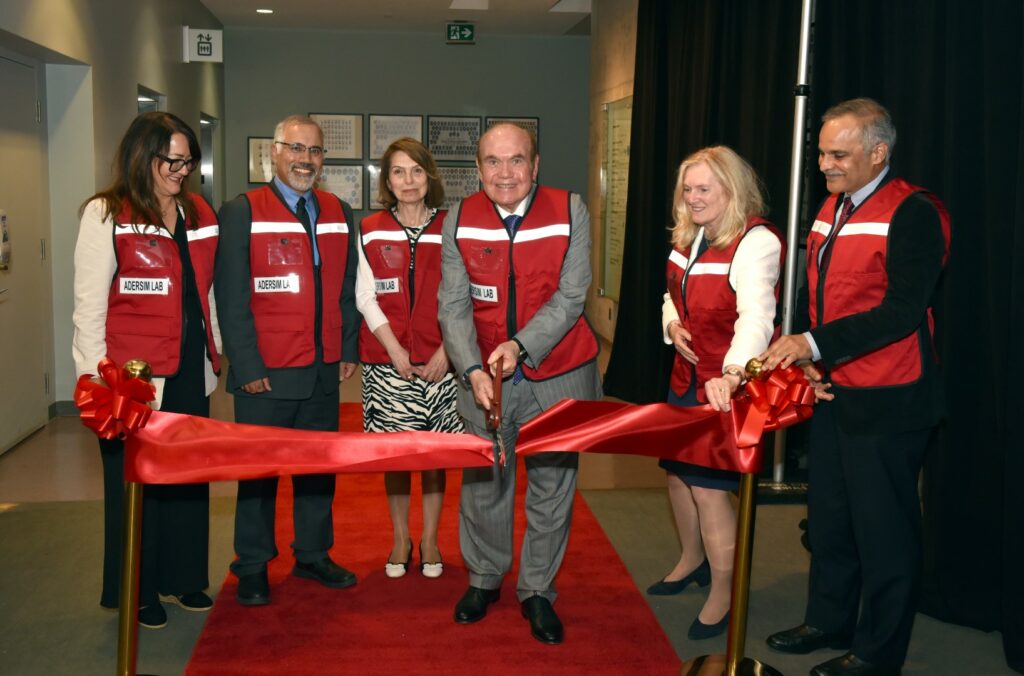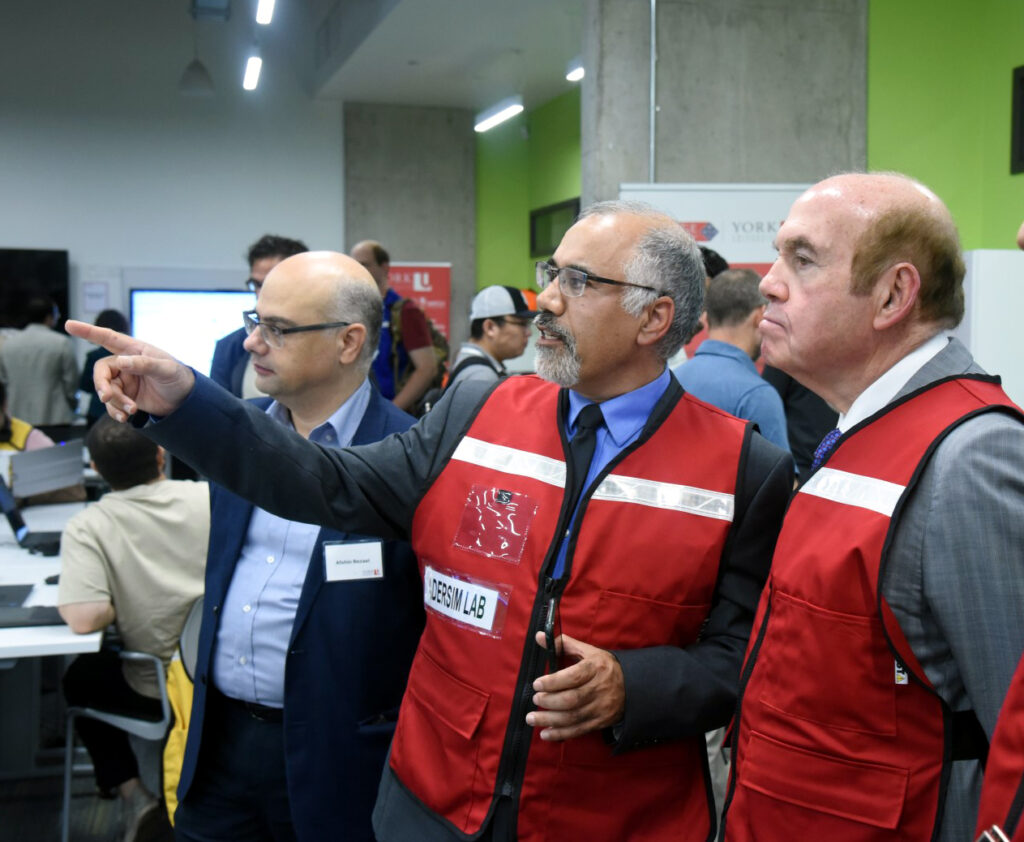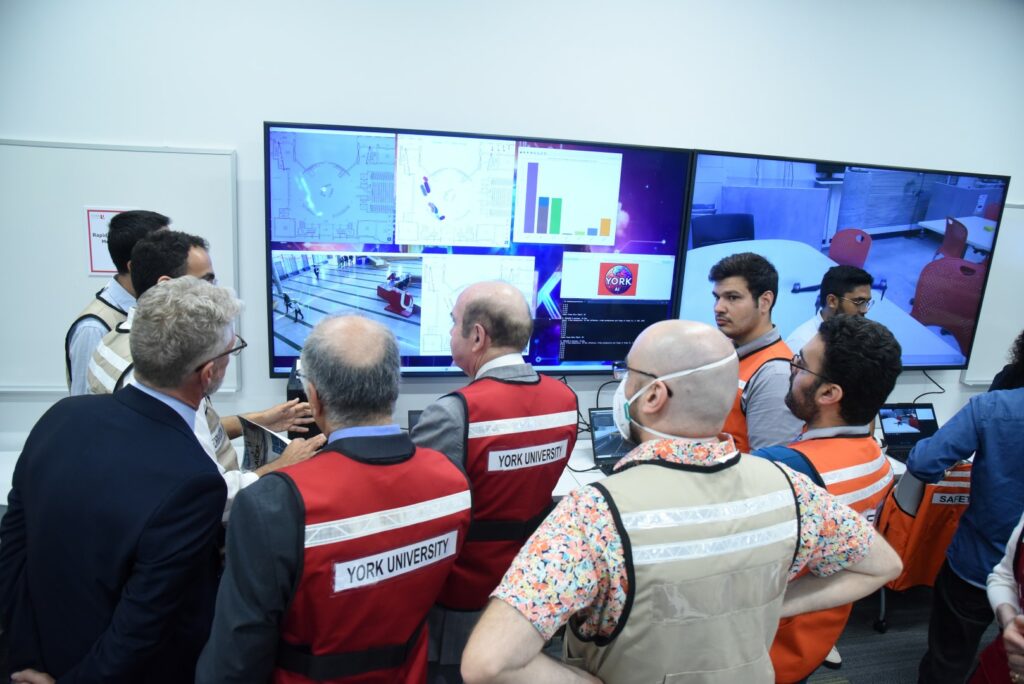Post
Published on July 5, 2024
Originally published by News@York (3 July 2024)
The launch today of the Victor Phillip Dahdaleh Advanced Disaster, Emergency and Rapid Response Simulation (ADERSIM) Lab and Emergency Operations Centre is thanks to some $3.5M in private and public funding
TORONTO, July 3, 2024 – As extreme weather and the likelihood of disasters increase, York University today opened its new state-of-the-art Victor Phillip Dahdaleh Advanced Disaster, Emergency and Rapid Response Simulation (ADERSIM) Lab, designed to act as an Emergency Operations Centre (EOC), thanks to close to $3.5 million in private and public funds.
Philanthropist and York alumnus Victor Dahdaleh and his wife Mona donated $2 million through The Victor Dahdaleh Foundation towards construction, equipment and operating costs for the lab’s EOC. In addition, the Ontario Research Fund (ORF) through the Ministry of Colleges and Universities contributed $1.45 million in initial funding.
As an EOC, the Victor Phillip Dahdaleh ADERSIM Lab is now equipped to manage, coordinate and act as a hub to support large-scale emergency operations. It will allow researchers to conduct research, train, simulate, as well as evaluate rapid emergence response strategies by government, non-government and private sector organizations across Canada and around the world, while providing assistance to other EOCs.

“The generous donation by The Victor Dahdaleh Foundation and funding from the Ontario Research Fund will allow York to make a positive difference in disaster and emergency planning not only in Ontario, but throughout Canada and around the world,” says Rhonda Lenton, president and vice-chancellor of York University. “I want to thank Victor and Mona Dahdaleh and the government of Ontario for supporting York in its mission to advance the UN SDGs in ways that serve our local and global communities.”
The goal is to enhance disaster and emergency planning and rapid emergency response strategies to help support and train others for when disaster strikes anywhere in Canada or the world. The Victor Phillip Dahdaleh ADERSIM Lab will develop emergency management tools and technologies, train students and industry partners, and operate as a primary or support EOC during real emergencies. It is the only multifunctional EOC for research, training and operations at a university in Canada.
“Today, as we officially open this lab, we are celebrating a new facility with cutting-edge equipment. With our recent global experience of the COVID pandemic and now with more extreme weather events because of climate change, we know that disasters and emergencies are a fact of life, and they will become more frequent and perhaps even more severe,” says Victor Dahdaleh. “The centre is a national and global network. The research you will do here will be good for Ontario, Canada and the world.”

As a new Emergency Operations Centre at York, it is crucial to provide critical predictive and decision tools to emergency managers through modelling and rapid response simulations to provide urgent training during and immediately after emergencies. The simulations include computer as well as human-based simulations, or a combination of both, using cutting-edge extended reality and artificial intelligence.
“We are observing more and more emergencies that require activation of EOCs. Our EOC is unique for several reasons including its research, training and operational focus,” says Ali Asgary, executive director of ADERSIM and professor of disaster and emergency management in the Faculty of Liberal Arts and Professional Studies. “This means that we need to be able to develop more tools and technologies to support the EOCs, train more students and professionals to use these tools and learn how EOCs function and operate. More importantly through our research, our EOC can provide support to other activated EOCs in Canada and globally as needed.”
Through rapid response sensing, monitoring and emergency communications, the Victor Phillip Dahdaleh ADERSIM Lab EOC will provide critical information to decision makers during emergencies and disruptions. Using data mining to extract and share critical data and develop rapid dashboards, it will support emergency management functions and operations. It will also help develop tools and technologies, as well as mapping and visualization to support emergency logistics and transportation needs.
The plan for the Victor Phillip Dahdaleh ADERSIM Lab EOC is to conduct field research as soon as emergencies happen to collect data and information that can be unavailable after emergencies end.

In addition, through partnerships, the lab can provide access to key information and data to guide practical and applied research projects and technology development to best tackle real world problems. Internships and exchange programs will further broaden the training of students and benefit partners.
The lab will expand capacity for research and training in areas of particular importance to the world, through health, disaster and risk management, but also further York’s commitment to taking action on the UN SDGs.
This most recent donation from Victor and Mona Dahdaleh, global philanthropists focussed on health, education and social and economic development, brings their total support to York to more than $24 million. With a degree in business administration from York, Victor Dahdaleh is the largest alumni donor in the University’s history.
Today’s event included a tour of the Victor Phillip Dahdaleh ADERSIM Lab EOC with a live demonstration where guests could use virtual and augmented reality tools during a simulation of an emergency. At the same time, several stations around the room highlighted different emergency management functions, while another simulation highlighted what would happen during a live disaster.
Themes | Global Health & Humanitarianism |
Status | Active |
Related Work |
N/A
|
Updates |
N/A
|
People |
You may also be interested in...
Nineteen Exceptional Scholars Awarded 2024-2025 Dahdaleh Global Health Graduate Scholarships
The Dahdaleh Institute is delighted to announce this year's recipients of the 2024-2025 Dahdaleh Global Health Graduate Scholarships, and we extend our warmest congratulations to the following recipients: "We are proud and elated to support ...Read more about this Post
Don't Miss Our Winter 2023 Lineup of Events
Join us for a winter semester packed with insightful seminars from inspiring global health researchers at the Dahdaleh Institute: How to Influence Public Policy...What Happens When You Leave the Room? with Jean-Jacques RousseauGlobal Environmental Changes, ...Read more about this Post
Key Moments from the Trust and Political Sociology of Health Workshop
The "Trust and Political Sociology of Health" research workshop took place on April 4th at the Dahdaleh Institute for Global Health Research, York University. This forum brought together senior and emerging scholars, practitioners, and students ...Read more about this Post
